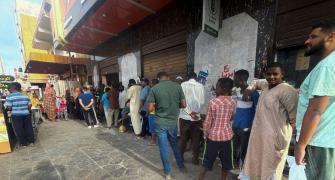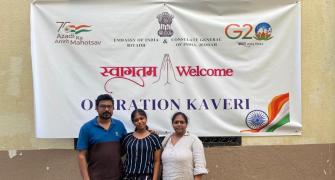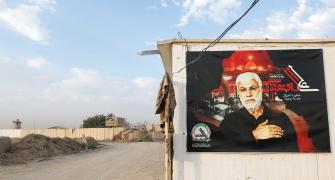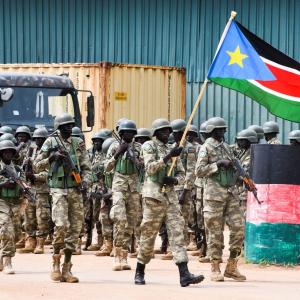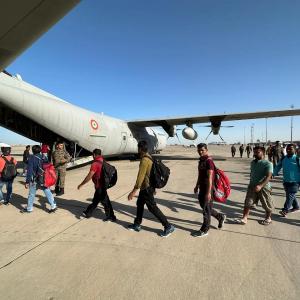
Only rarely do conflicts in faraway countries become issues in elections.
But the campaign to the Karnataka assembly election saw a rapid rhetoric escalation culminating in Prime Minister Narendra D Modi personally overseeing the operations to extract Indians from war-hit Sudan.
The Congress in Karnataka now claims that but for its intervention, Indians in Sudan would have been left to fend for themselves.
But history tells us that a well-oiled machinery is in place that will always respond, no matter the complexion of the government in power.
The current controversy started with a tweet last month from Congress leader and former Karnataka chief minister Siddaramaiah who said 31 people from Karnataka's Hakki Pikki tribe had been stranded in Sudan without food and the government was yet to initiate action to get them back.
Siddaramaiah claimed one Indian had already died among 60 other foreign nationals. 'I urge the government to intervene urgently,' he said.
This prompted an immediate outcry from supporters of the Congress as well as the government, including those who had never heard of the Hakki Pikki.
But the sharpest riposte came from Minister of External Affairs S Jaishankar. 'Simply appalled at your tweet! There are lives at stake; don't do politics. Since the fighting started on April 14, the Embassy of India in Khartoum has been continuously in touch with most Indian Nationals and PIOs in Sudan,' the EAM tweeted.
Never one to let anyone else have the last word, Siddaramaiah shot back: 'Since you are External Affairs Minister, Dr Jaishankar, I have appealed to you for help. If you are busy getting appalled, please point us to the person who can help us bring our people back.'
Within hours, the prime minister had taken charge.
He called for a meeting and, taking advantage of a short ceasefire, the government announced Operation Kaveri, like Operation Ganga (to get Indians out of Ukraine after it was attacked by Russia) and Operation Devi Shakti (to get Indians out of Afghanistan) previously.
It is possible that if Siddaramaiah had not been fielded from the Kolar assembly constituency, which has a small number of Hakki Pikki voters (11,000 at best, according to local media), the government would have carried on doing its work of protecting the interests of Indians in war-torn zones quietly: as it has done in the past.
But this -- and past -- government interventions have provided a new dimension to India's foreign policy responsibilities.
Hakki Pikkis (Hakki in Kannada means 'bird' and Pikki means 'catchers') are a semi-nomadic tribe, traditionally of bird catchers and hunters, from Karnataka.
Their knowledge of the forest and traditional medicine is extensive and is prized by the local Sudanese community.
Like many other groups of Indians, they went to Sudan in search of work and were caught in a civil war, following a clash between two sets of militias.
Ambassadors who have served in war-torn countries say India is probably one of the few countries in the world that has successfully carried out very large-scale evacuations.
"In the past four decades, India has launched rescue and humanitarian efforts in Iraq, Lebanon, Yemen, Libya, and several other African countries," says Anil Trigunayat, former ambassador to Libya and Jordan.
"India may not have direct influence over the two generals (in Sudan), but it has significant economic interests and nearly 3,000 Indian Diaspora which is stuck in this war of attrition and has always stood with the Sudanese people through its humanitarian and capacity-building assistance," he says.
"India has tremendous expertise in evacuations from conflict zones and should be able to bring all Indians safely," Ambassador Trigunayat adds.
Op Kaveri is only one on a long list of rescue missions the Indian government has launched.
The most massive was during the Gulf War over three decades ago.
In 1990, when Iraq attacked Kuwait, the Indian government brought back over 100,000 citizens in a little over two months.
What is more, it was not a strong, majority government in power at the time but a rickety coalition comprising the Bharatiya Janata Party, Janata Dal, and the Left, presided over by V P Singh, tip-toeing through the minefield of oil politics.
Iraq's invasion of Kuwait began on August 2, 1990, and around 170,000 Indians were in the region at the time.
Around three weeks later, India's external affairs minister at the time, Inder Kumar Gujral, visited Iraq and met Saddam Hussein to ensure the safe return of Indian citizens.
The operation started with using military transport aircraft, but had to later switch to Air India because of difficulties in using military aircraft in the operation.
As the airspace had closed, Indians were taken to Amman in neighbouring Jordan via buses.
Over 63 days, 488 Air India flights brought back over 100,000 Indians from the war-torn region.
Says K P Fabian, who was joint secretary (Gulf), at the time: "The important thing was that thanks to the excellent rapport between the external affairs ministry and the civil aviation ministry, we did not waste time in routine writing of notes," says Fabian.
Fabian and other diplomats say Indians are now working all over the world and will need support if hostilities break out.
Says Constantino Xavier, fellow in foreign policy and security studies, Centre for Social and Economic Progress: "New Delhi will not be able to continue relying on heroic and ad hoc efforts. Given that the Diaspora is expanding and becoming more mobile and assertive, evacuation operations are likely to become more frequent, complex, and distant, which poses challenges to capacity and coordination."


